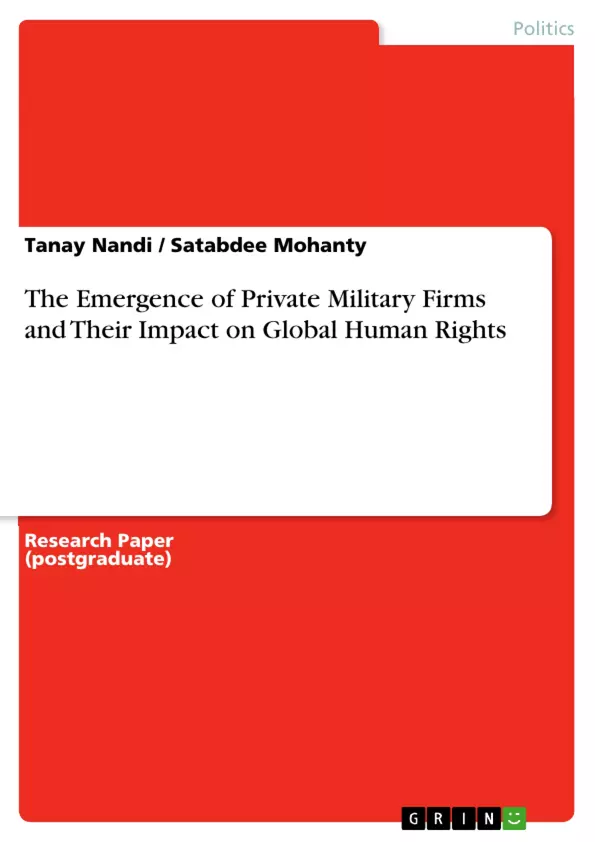International law has generally been considered by the students of law as a subject with little practical relevance. However, the importance of international law in legal practice is increasingly being recognized in recent years. This may, in great measure, be attributed to the impact of globalization. Great strides in the field of commerce, technology and communication make one doubt whether transnational boundaries are going to disappear. Environmental concerns and human rights issues really transcend state borders and assume global dimensions. International law and international institutions have to play a dynamic role in response to the new challenges. In current situation, the study of international law can no more remain uninspiring.
Arising out of the dying embers of the Cold War, private military firms (PMFs) market their military force and skills primarily to decolonialized States, countries overrun with domestic conflict and unable to provide effectively for their own security needs. As a result, PMFs amass unchecked power to affect conflict resolution, world economic stability, and geo-strategic negotiations. Indeed, as corporations become larger--both economically and politically--corporate managers increasingly engage in decision-making traditionally exercised by politicians. The decentralization of international security from state-organized militaries not only threatens the traditional Westphalian model of state-monopolized force , but also accentuates the inability of international law to hold private actors accountable for their unchecked violation of basic human rights in conflict ridden regions.
Inhaltsverzeichnis (Table of Contents)
- Introduction
- An Overview on PMF's
- What are Private Military Companies/Firms?
- Emergence of PMFs
- Works Undertaken by the PMFs
Zielsetzung und Themenschwerpunkte (Objectives and Key Themes)
This paper critically examines the theoretical risks posed by private military and security company activity with respect to violations of international humanitarian law and human rights, together with the incentives that these companies have to comply with those norms.- The emergence and expansion of PMFs in the context of the post-Cold War era and the "War on Terror."
- The impact of PMF operations on international humanitarian law and human rights.
- The challenges of regulating PMF activity and ensuring accountability for their actions.
- The incentives for PMFs to comply with international norms.
- The potential risks posed by PMFs to global security and stability.
Zusammenfassung der Kapitel (Chapter Summaries)
Introduction
The paper introduces the growing significance of Private Military Firms (PMFs) in modern armed conflict and post-conflict reconstruction, particularly in the context of the "War on Terror." It highlights the potential for PMFs to violate international humanitarian law and human rights, outlining the need for critical examination of their activities.An Overview on PMF's
What are Private Military Companies/Firms?
This section defines PMFs as businesses providing professional services linked to warfare, representing a modern evolution of the mercenary profession. PMFs offer a range of services, from tactical combat operations to logistical support and technical assistance.Emergence of PMFs
The emergence of the modern private military industry is attributed to factors like the end of the Cold War, transformations in the nature of warfare, and the trend towards privatization of government functions. The paper explores how these factors fueled the growth of PMFs, particularly in the context of increasing global instability.Works Undertaken by the PMFs
This section discusses the increasing reliance of militaries worldwide on PMFs, citing examples from Afghanistan and Iraq. It highlights the significant role of PMFs in Iraq, where they are employed in large numbers to carry out military functions, demonstrating their growing influence in contemporary conflict zones.Schlüsselwörter (Keywords)
The main keywords and focus topics of this paper are private military firms, PMFs, international humanitarian law, human rights, global security, conflict resolution, war on terror, privatization, accountability, regulation, and the impact of PMFs on international law. These terms encapsulate the core concepts and concerns explored within the text.Frequently Asked Questions
What are Private Military Firms (PMFs)?
PMFs are business entities that provide professional services linked to warfare, including tactical combat, logistical support, and technical assistance.
Why did the private military industry grow after the Cold War?
The growth was fueled by the downsizing of state militaries, global instability in decolonized regions, and the general trend towards privatizing government functions.
How do PMFs impact global human rights?
PMFs often operate in legal grey areas, making it difficult to hold them accountable for human rights violations in conflict zones like Iraq or Afghanistan.
What is the Westphalian model of state-monopolized force?
It is the traditional political principle that only the state has the legitimate right to use organized military force, a concept challenged by the rise of PMFs.
Can international law regulate PMFs effectively?
Currently, there is a significant gap in international law regarding the accountability of private actors for violations of humanitarian law, which this paper critically examines.
- Arbeit zitieren
- Tanay Nandi (Autor:in), Satabdee Mohanty (Autor:in), 2010, The Emergence of Private Military Firms and Their Impact on Global Human Rights, München, GRIN Verlag, https://www.grin.com/document/149641



